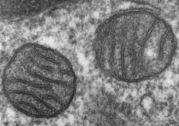The term of the day is reductionism. It is the process by which people (especially scientists and doctors) reduce large problems down to smaller, discrete components. Sounds like a logical way to solve a problem right? You break it down into a series of manageable chunks and solve each one individually. The only problem is that what we gain in efficiency we lose in perspective. So, let’s try to gain a little back, shall we?

A Transmission Electron Microscope image of mitochondria in a cell.
If you look at a cell really closely, what do you see? Grab a typical light microscope and you will see a little circle, maybe with a blob in the middle, but you can still see the big picture. Dust off that old Transmission Electron Microscope your dad has in the basement and you start to see some pretty crazy stuff like organelles and fibers within the cell itself. As you start to visually zoom in, you can also start to functionally zoom in. When you observe the entire cell, you can observe the cumulative processes that happen in the entire cell at that exact point in time. Once you get down to the individual mitochondria, all you can see are the metabolism processes going on in that organelle, but you lose sight of all the other individual processes happening everywhere else like protein synthesis, RNA transcription, lysosomal hydrolytic processes, and everything else that goes on. If you look at one individual protein inside a mitochondria, as is possible now with high resolution microscopy and crystallographic methods, you can tell a lot about how that protein works, and you can isolate its function from all the other processes, but if you look at just that and nothing else then suddenly you lose all sense of context entirely. Get it yet?
The same principle can be scaled up a few levels and can be applied to medicine. One example of weird things that happen when we go too far down the reductionist path is the link that was recently published between intestinal bacteria and the effectiveness of vaccines (Immunity 10.1016/j.immuni.2014.08.009 (2014).). It seems strange that there would be any correlation between serum antibody count and a protein that is found in the bacteria that live in the gut, but these kinds of effects (some even stranger yet) do exist. Our bodies are complex ecosystems within themselves, and they contain an unfathomable number of individual reactions that drive processes within billions of cells, that form tissues and organs and eventually an entire living organism.
Ecology is the one science that brings the focus from reductionist to wholist views of the world. There are a lot of scientists now realizing that the ecological view of our planet is much more complex than we have ever realized. From all the non-living things like weather, climate (which is different from weather), ocean currents, and soil composition to the living things like animals, plants, soil microbial populations, and overall nutrient cycling, plus so many other factors. The mantra for ecologists has always been “everything is connected” and now, more than ever, we are realizing that is true.

A stock photo showing a diverse group of people, most likely total strangers, symbolizing teamwork.
So all this is great and wonderful to talk about, but where does it get us? What exactly does this mean for you as you read this? Well right now it means that we have to change the way we think about health, and the way we think about science. Interdisciplinary cooperation in the hospitals and in the labs is something that is just now in its infant stages. There is along way to go before information can be shared freely and egos can be overcome (which is really the bigger issue here). Professionals need to be willing and able to deal with problems as a community rather than as individuals. If that happens, which is relatively unlikely, we might see gigantic strides forward in scientific research, and the development of true wholistic health.
In theory we could be treating diseases with medicine that effects the entire body, and preventing them by boosting our bodies natural responses and homeostatic conditions. It sounds like those terrible commercials for homeopathic remedies, but if we apply real science (not the pseudoscience I will talk about in a later post) we could change the lives of every single person on this planet. A lofty goal, but one we could attain.
